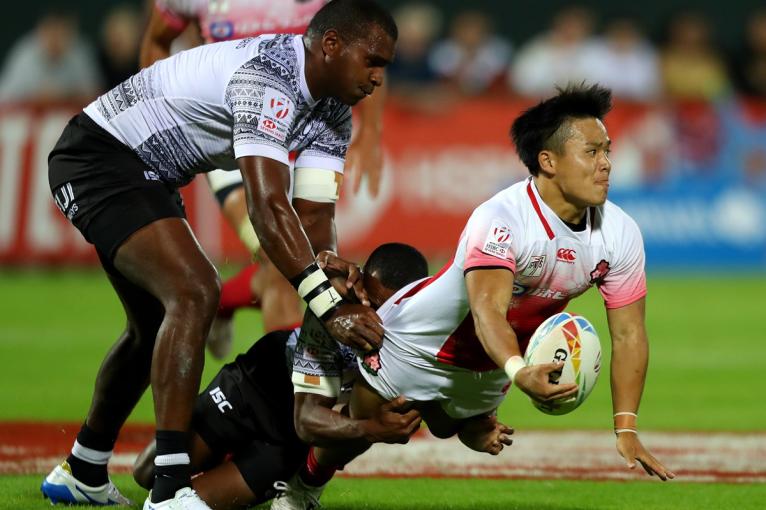Japan’s national rugby mantra has always been to move fast and break something. In recent Rugby World Cups in XVs, that something has repeatedly been the gainline, often followed by opponents’ hearts.
Think South Africa in 2015, or Ireland and Scotland, in 2019.
At the Olympic Games, the Japanese men’s sevens team has also burnished that reputation. At the sport’s Olympic debut in Rio de Janeiro, in 2016, an unfancied Japan beat New Zealand, Kenya and France en route to the bronze medal match.
Fiji’s gold medal exploits rightly stole the headlines at that tournament but Japan’s fourth-place finish was a considerable achievement.
Japan are not touted as contenders for a medal heading into Paris in 2024. On paper, they are as unfancied as it gets.
Japan Sevens are settling in well in France ahead of Paris 2024 🙌#Japan7s | #TeamJapan pic.twitter.com/EOY0ThQjvZ
— Japan Rugby (@JRFURugby) July 15, 2024
In 2023, Japan were relegated from the SVNS Series, then failed to bounce back via this year’s Sevens Challenger tournament, leaving them as the de facto 21st ranked team in the world. In their group in Paris, they will be up against South Africa (ranked sixth), Ireland (fifth), and New Zealand (fourth).
Rankings, however, can be misleading. And there’s enough devil in the detail to make it unwise to discount Japan from being the surprise package at this year’s Olympic Games.
The detail that needs considering is that, under former England and Great Britain head coach Simon Amor, Japan have used this season to adapt their style of play to give them the best possible chance of competing at these Olympic Games.
The price they have paid in laying down a new structure – or rather, in freeing themselves from a structure – has been two disappointing 10th-place finishes in the Montevideo and Munich legs of the Sevens Challenger.
The style that won us the Asian qualifier is not the style we need to compete at the Olympic Games
But changing things up is something Amor felt they had to do. And, having qualified for the Olympic Games last November, they had the luxury of time to do it.
“We have been trying to play a new style,” Amor said. “Because the style that won us the Asian [Olympic] qualifier is not the style we need to compete at the Olympic Games.
“We want to be more chaotic and play more to our strengths, and the strength of Japanese players is that they have wonderful agility and footwork. It’s been difficult. But progress has been made.”

Find any YouTube compilation of great tries from the 1970s and 1980s and you’ll find epic length-of-the-field Japanese efforts.
In more recent times, their highlights reel has been just as impressive. What stands out is their ambition with the ball in hand. It has always been the Japanese way. Amor hopes to harness those instincts and let them run wild at Stade de France when the rugby sevens competition gets under way on July 24th.
“We want to play stuff that gets the fans on the edge of their seats and makes them go mad. Everyone loves Japan as a country. I have loved my time in the country and so many people love the country so if they can also love our rugby style as well, we can have 80,000 people cheering for us in Stade de France.”
Installing Japan’s new style of play has involved cultural shifts as much as technical and strategic ones, due to the popularity of XVs over sevens in Japan.
We’ve done a lot of work helping good players understand that it’s not a bad thing to make mistakes
“In Japan, there isn’t a strong sevens culture,” said Amor, who captained England in the early and mid-2000s, leading them to four Hong Kong titles and winning the IRB Sevens Player of the Year in 2004.
“League One [the highest tier of XVs rugby in Japan] is incredible right now. And there’s not as much sevens experience in the country. When you’re trying to play a fast style of sevens with little experience, it means things are going to go wrong.
“In Japanese culture, honour is huge. And it’s a great honour to play for your country. The players are immensely proud to do so and, understandably, they don’t want to make mistakes.
“But in sevens you will make mistakes. So we’ve done a lot of work helping good players understand that it’s not a bad thing to make mistakes.”
Amor’s plan for Japan is drawn from his own deep well of coaching experience. He coached England between 2013 and 2019, as well as Team GB at Rio 2016, steering a scratch team to a silver medal.

In taking Japan to Paris 2024, Amor is the first person to coach two different nations in sevens at an Olympic Games. His experience with Team GB in Rio means he is fully prepared for the unique, sometimes strange, environment. He hopes it might play into Japan’s hands.
“This is the Olympic Games, and it does funny things to people, there is extra pressure. But the pressure on Japan is relatively low, while it’s higher on other teams. You are going to get some real drama.
“What makes it so special is that everyone is there to try and win a medal. You don’t work that hard to turn up and play pretty rugby.
“For Japan to do that we need every neutral in the Stade de France to be cheering for Japan. We need that to give ourselves a lift and inspire us to do something special.”
Japan may be outside chancers for a medal in Paris. But it’s a running lane they’re used to, and one they’ve used to their advantage in the past. Whether they break more of their opponents’ hearts, or their own chances at glory, they will be great to watch.


Comments
Join free and tell us what you really think!
Sign up for free